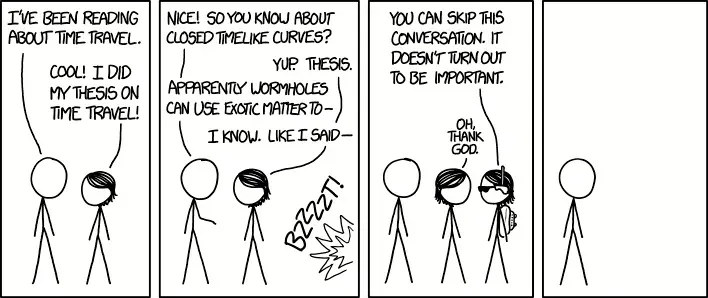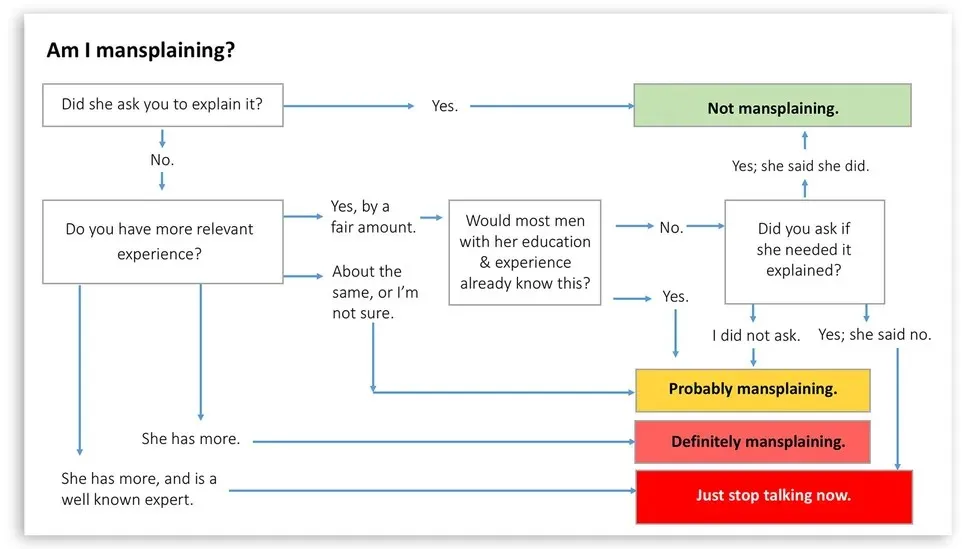Is 'mansplaining' a thing?
Katrina Borthwick - 26th May 2025
I have an out-of-town meeting, and the other party is bringing a lawyer. I print a recent court decision that I think could be very relevant. I read it, this takes a while, but I come to the conclusion that nope, it’s not relevant to my case. Time wasted. I’m in a rush and there is no recycling bin near me, so I put the court decision in my bag and start driving.
I get to the meeting, and the lawyer is there. He’s an older man and I’m a younger woman. He proceeds to explain how much of a legal hole we are in, and how there has just been a court decision that confirms this. He then explains the implications of the court decision at length. He gets it so wrong I think he must be doing it on purpose. I’m not a lawyer, so he’s looking pretty confident he has nailed it. My lips are pinched into a thin line.
Finally, the diatribe stops. I reach into my bag and pull out the court decision. “Oh, you mean this decision?” and put it on the table. “Well, I think you will find that is not the case. If you turn to the end section you will see the judge says……”. His face fell.
Unfortunately, things seldom work out this way. I repeatedly and often get told what my job is. There could be many reasons for this - not just my gender - but it gets a bit draggy after a while. I’m over it. When it happens now, I don’t think of how I will fight back. I think of early retirement.

Don’t google it!
So where am I going with this?
I have been thinking a bit about the term ‘mansplaining’ a lot. It has been around for over a decade now, but seems persistent. I personally think the term ‘mansplaining’ is rude, but I have used it in the past, and it does communicate a certain ‘experience’ without needing too many words.
When it comes down to it, though, is mansplaining just condescension, or rude behaviour, with a fancy new gender-specific label? It seems like it is a pejorative term. So, is there any science to it? I’m particularly interested in whether this behaviour really is gender-specific, and whether it’s having any sort of negative impact.
Looking on the internet for answers wasn’t super helpful. Searching for ‘mansplaining’ gave me 2.96 million results. When I added the word ‘research’, it reduced this number to exactly 666,000 results (spooky). Most of these appear to be opinion pieces, with many of them published ages ago. Many of the references in these articles were linking to other opinion pieces. An endless chain of streams of consciousness.
One paper I found looked like it might be leading to a legitimate published paper, but the title was pretty inflammatory and didn’t sound very scientific (“Mansplaining, Manterrupting & Bropropriating”) - and the journal had a bright yellow cover page with a picture of sliced citrus fruit. After googling the author, I found out it was in fact their own publication. She does have a doctorate in sociology, so that’s a plus. But, to answer the burning question…… I found no reason for the fruit.
There was too much material to sift through. I figured that perhaps things might be changing in terms of the behaviours relevant to ‘mansplaining’, so I narrowed it down to recent research papers in the last few years. I looked at research papers only, no opinion pieces allowed. The following is an overview of the actual science that I could find.
The recent science
A 2024 study (Fokkema & Pollmann) found that men didn’t think they knew more than women, nor were they more likely to explain things. It also found that women are more likely to be insulted by an explanation than men, regardless of the gender of the person explaining.
Another 2024 study (Santoro & Markus) looked into the effects on women when they were given ‘unresponsive’ advice. That is advice that is either not asked for, generic or prescriptive. They found this type of advice from men negatively affected women, making them feel less respected, powerful, and trusting, and having a smaller ‘size of self’. But, interestingly, the gender of the advice-giver didn’t matter in terms of effect. On anticipating receiving unresponsive advice, they found women anticipated things would go worse if the advice giver was a man.
A 2023 study (Briggs, Gardner & Ryan) found that when a condescending explanation is given, or interruption or voice non-recognition (not getting a word in) occurs, women reacted more negatively and were more likely to see gender bias as the cause when the communicator was a man.
A 2022 study (Smith, Schweitzer, Lauch & Bird) found that men were more likely to ‘mansplain’, and women were more likely to be on the receiving end of it, but that women did it too. Evidence suggests that mansplaining may form part of a group of behaviours called ‘incivility’ (rudeness). It did show that this behaviour was predictive of a significant variance in job satisfaction and turnover that went beyond those we see with regular incivility. They claim that this research “underscores that mansplaining is more than a social media phenomenon. Rather, it is a form of gendered mistreatment …”
Looking at those impacts more, I stumbled on a 2022 study (González-Pérez et al) specifically around women in Engineering. It found that the tendency for women not to stick with Engineering seemed to be related to the chilly/hostile environment in classes, the study workload, lack of role models, and a mismatch between female gender roles and STEM (Science, Tech, Engineering and Maths) in society. In other words, they didn’t feel like they belonged.
Another 2022 study (Scribner et al) wanted to understand how women experienced sexist comments, which they say are normalised in everyday conversation. I will say that this study was done in Utah, US, so may not be generalisable to New Zealand. The themes that emerged were that a number felt that sexism isn’t getting better, is worse in Utah than other places, and is very common. A significant number of women made comments that indicated religious and cultural factors in Utah strongly influence sexism. There was also a dominant theme that much of the sexist behaviour is more subtle than direct. There are a multitude of sexist quotes in the paper if you dare to look; here are a couple of milder ones, relevant to this topic:
“I let him continue explaining something I already knew, and I did not stop him or call him out.”
“In a work meeting my boss told me, ‘The way you care too much about people is impacted by your relationship with your Heavenly Father. I can help unpack that for you so you can understand.”

Conclusion
The situation certainly isn’t as simple as popular opinion pieces suggest. I don’t really have a conclusion or simple explanation from all of this reading; just the thought that it wouldn’t hurt for everyone, regardless of gender, to take care they aren’t in fact ‘splaining’ things to people that may know more, and to avoid unresponsive advice. Providing advice that is not asked for, or is generic or prescriptive, may be an example of uncivil behaviour. There are also indications that women may be more primed to expect this sort of behaviour from men, and that’s something that needs to be taken into account.
The World Economic Forum wrote a handy piece about the five ways you can determine a person’s actual expertise, and therefore how much of an idiot you will look like if you get to ‘splaining’. These points are highly relevant to skeptical thinkers in other contexts too:
-
Based on what you know about the person, how likely is it that they are an expert?
-
What is their communication style? Do they listen and offer opinions and views only when well founded?
-
Do they go in depth? Or are they making sweeping statements and repeating the same general message over and over again?
-
Is anybody actually certain about the topic? An expert will qualify statements with words like “maybe” or “could” and know the limits of our knowledge. For example they may give a statistical likelihood of an earthquake, but won’t be able to say when one might occur.
-
Can they provide information flexibly? For example by adjusting their communication to their audience and giving you just the information you need.
In terms of using the term ‘mansplaining’ – and at the risk of sounding condescending - perhaps it’s not wise to say something behind someone’s back that you wouldn’t be happy to say to their face.